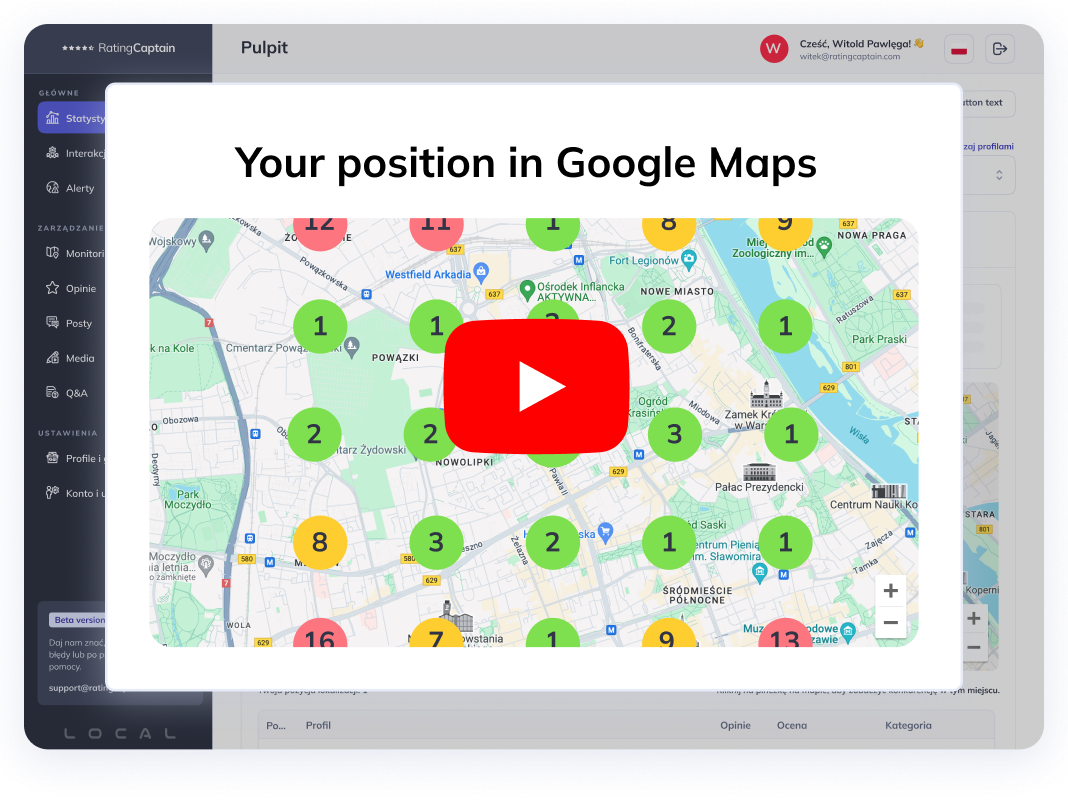

Guide to local SEO positioning: How to position your company's business card on Google?

Table of contents
The goal of local SEO is to enable potential customers to easily find information about the company and its services/products in a specific location in Google search results. How to do it well and make your company appear at the top of Google search results (including Google Maps)? Local SEO is an ongoing process, the effectiveness of which can be measured using tools such as Google Analytics (GA4) or Google Search Console. With these tools, you can monitor website visibility and traffic, search engine visibility, and high rankings in search results for specific keywords. What is local SEO positioning that allows increasing visibility? Let's start with what local positioning, also known as local SEO, actually is. Local positioning allows improving the position of a website, e-commerce store, or Google My Business listing in local Google search results for: - Keywords related to the company's activities (e.g., hair salon, air conditioning, or daycare) - In a specific location (e.g., Katowice, Opole Voivodeship, or Warsaw Ursynów). The goal is for your company to be shown to new customers and internet users when they enter a query like "hairdresser Wrocław". This is possible thanks to positioning, so it's worth taking care of all its elements, so that the website or listing can appear as high as possible in search results. Where to start optimizing your website? Focus on local keyword positioning! To effectively position your company in Google search results, start by optimizing your website for local keywords. This means adding contact information to the website, such as the company name, address, phone number, email address, and Google Maps link. Another important step is to use Google tools such as Google My Business (Google My Business listing), which allows creating a profile for the company and providing information such as opening hours, customer reviews, or photos. This allows better utilization of local search results and makes it easier for potential customers to find information about the company. It is also important to acquire links from other websites related to the company's activities in the specific location, which will help improve the website's position in search results. Website and Google My Business listing: How to improve rankings in search results and Google Maps? Let's summarize everything in a list. To effectively improve your company's position in search results using SEO, it is worth taking the following actions: - Optimize the website for local keywords: Add information such as the company name, address, phone number, email address, and Google Maps link to the website. - Utilize Google My Business listing (Google My Business): Create a profile for the company and provide information such as opening hours, customer reviews, or photos. - Collect reviews and respond to them in the listing: Reviews help potential customers verify the quality of services/products. Additionally, high average ratings and reviews containing keywords positively affect the position of the listing in search results (another element of keyword positioning). - Acquire links from other websites related to the company's activities in the specific location: The website's position in search results also depends on the number of backlinks that attract traffic to the site. - Create unique and valuable content on the website and in the listing: Content should be tailored to the needs of users and answer their questions and needs. - Monitor and analyze data: Using tools such as Google Analytics and Google Search Console allows monitoring website traffic and position in search results for specific keywords. - Avoid mistakes: It is important to avoid mistakes such as outdated information on the website or a lack of sufficient backlinks, which can negatively affect the website's position in search results. What Google tools can help with local website and Google My Business listing positioning? Not just positive reviews Google offers a range of tools that can help with local positioning. Here are a few of them: - Google My Business: This free tool allows creating a profile for the company using a Google account and providing information such as opening hours, customer reviews, or photos. This profile appears in Google search results and on Google Maps, making it easier for potential customers to find information about the company. - Google Maps: This tool allows displaying the company on a map along with information such as address, phone number, or customer reviews. This helps potential customers find information about the company and its location more easily. - Google Analytics: This tool allows monitoring website traffic, which helps better understand user needs and behaviors. This allows adjusting website content to their needs and better targeting advertisements. - Google Search Console: This tool allows monitoring the website's position in Google search results for specific keywords. This allows tracking positioning progress and detecting any errors on the website. - Google Trends: This tool allows monitoring the popularity of specific keywords and changes in their search volume. This allows adjusting website content to current trends and better targeting advertisements. - Google Tag Manager: It allows easy management of tags on the website, monitoring conversions, and analyzing data. Using these tools allows better understanding of user needs and behaviors and better tailoring website content to their needs. What mistakes should be avoided when positioning local SEO services? Regional/local company positioning is a complex process that requires precision and continuous adaptation to changing trends and Google search engine algorithms. Unfortunately, many companies make mistakes that can negatively affect their position in search results. Here are a few mistakes to avoid when positioning locally: - Lack of unique content: Content should be properly tailored to user needs and answer their questions. Without unique content, it is unlikely that your website will rank high in search results. - Lack of local keywords: In local positioning, it is important to include relevant keywords on the website that relate to your location. Without these keywords, your website may be difficult to find for potential customers in your area. - Outdated information on the website: Information such as address, phone number, or opening hours should be up to date. Customers may be concerned if they find outdated information on the website. - Lack of Google My Business reviews: Customer reviews are important for your online reputation. Customers trust the opinions of others, so it is important to gather reviews on Google My Business. - Low average rating in Google My Business listing: A low average rating can negatively affect the company's reputation and discourage potential customers from using its services. - Lack of backlinks: Backlinks are important for the website's position in search results, so it is important to acquire links from other websites related to your location. How to measure the effectiveness of regional positioning? Measuring the effectiveness of local positioning is an important part of the process because it allows determining whether the actions taken by the company are producing the expected results. There are several ways to measure the effectiveness of local positioning, here are a few of them: - Monitoring position in Google search results: Tools such as Google Search Console allow monitoring the website's position in search results for specific keywords. This allows tracking positioning progress and detecting any errors on the website. - Website traffic analysis: Tools such as Google Analytics allow monitoring website traffic and gathering information about users, such as their demographics and behavior on the website. - Monitoring customer reviews: The Google My Business service allows monitoring customer reviews and gathering information about their satisfaction with the company's services/products. - Conversion analysis: Using tools such as Google Tag Manager allows monitoring conversions and analyzing data.
Please rate this article
Local SEO tool
for agencies
Automate your local SEO
and track Google Maps visibility

